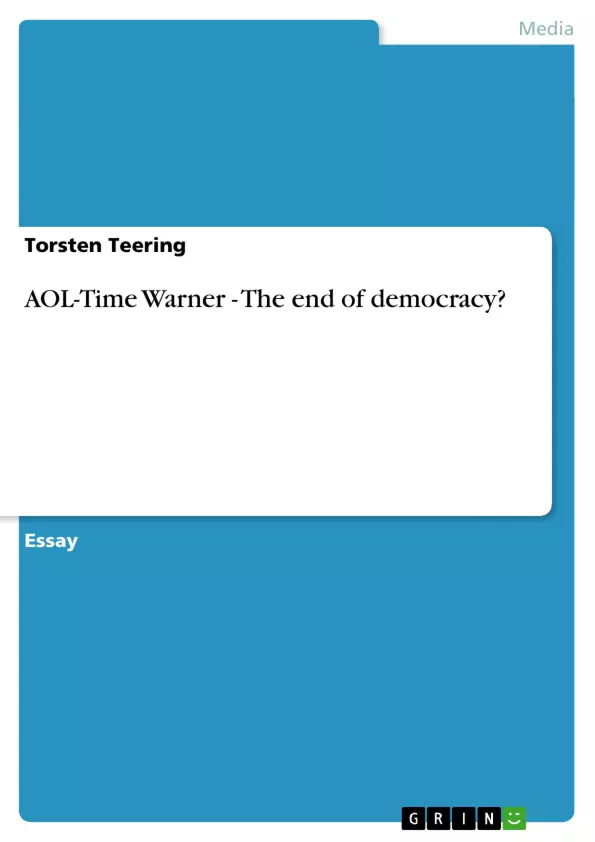This essay will evaluate the implications of the AOL Time Warner merger on news accuracy and identity. It will firstly describe the changing economic situation in the 1980s and 1990s, which led to media ownership concentration. The essay will further give a brief summary of both companies and their way of becoming one and describe the essential term of "synergy". The next paragraph will then summarize the position of Frank A. Blethen, the publisher and CEO of the Seattle Times Co, towards media conglomerates. The essay will further discuss the concerns he raised: Firstly, he argues that conglomerates decrease the diversity of news and that the quality of news will be less important for big companies than profit. He further proclaims conflicts for the journalist in reporting negative news about the company they are working with and mentions the problems for local news providers. The essay will then discuss other possible effects and will finally evaluate whether the merger has been a success until now.
Inhaltsverzeichnis (Table of Contents)
- Introduction
- Changing economy
- The road to the merger
- What does "synergy” mean?
- Is media concentration the end of democracy?
- What happens to diversity?
- Is everything dumbing down?
- Is the independent reporter a thing of the past?
Zielsetzung und Themenschwerpunkte (Objectives and Key Themes)
This essay assesses the impact of the AOL Time Warner merger on news accuracy and identity, considering the evolving economic landscape and the concept of media concentration. It explores the historical background of the merger, delves into the meaning of "synergy," and examines concerns regarding the role of media conglomerates in shaping news content and journalistic independence.
- The influence of economic shifts on media ownership
- The potential impact of media concentration on news diversity and quality
- The implications of conglomerates for journalistic independence and accountability
- The role of synergy and cross-promotion in shaping media content
- The potential for "dumbing down" of news and the shift towards commercialized online journalism
Zusammenfassung der Kapitel (Chapter Summaries)
- Introduction: This chapter provides an overview of the essay's focus on the AOL Time Warner merger's implications for news accuracy and identity. It establishes the context by outlining the changing economic climate of the 1980s and 1990s, leading to media ownership concentration.
- Changing economy: This section describes the economic transformations that led to the rise of "alliance capitalism" and the emergence of monopolies and oligopolies in various industries.
- The road to the merger: This chapter outlines the merger of AOL and Time Warner, providing background information on both companies and their respective roles in the media industry. It highlights the concept of "synergy" and its potential impact on the combined entity.
- What does "synergy” mean?: This section delves into the meaning of "synergy" by analyzing the example of the movie "Space Jam," demonstrating how cross-promotion and interconnectedness can shape consumer behavior and media consumption.
- Is media concentration the end of democracy?: This chapter presents the concerns of Frank A. Blethen, who views media conglomerates as a threat to democracy by limiting the diversity of news and jeopardizing journalistic independence.
- What happens to diversity?: This section examines the potential impact of AOL Time Warner on news diversity, considering the company's share of internet traffic and the broader trend towards consolidation in online news. It raises questions about the potential for manipulation of network traffic and the availability of diverse perspectives.
- Is everything dumbing down?: This chapter explores the potential consequences of the merger for the quality and focus of news, highlighting concerns regarding the dominance of profit-driven aspects and a shift towards commercialized and homogenized content.
- Is the independent reporter a thing of the past?: This section discusses the challenges to journalistic independence in the context of the merger, considering the potential for conflicts of interest and the ability of reporters to criticize affiliated companies.
Schlüsselwörter (Keywords)
The main keywords and focus topics of this text include media concentration, AOL Time Warner merger, synergy, news diversity, journalistic independence, economic transformations, alliance capitalism, monopolies, oligopolies, cross-promotion, and commercialized online journalism.
Frequently Asked Questions
What is the main concern regarding the AOL-Time Warner merger?
The main concern is whether media concentration threatens democracy by reducing news diversity and quality in favor of profit.
What does "synergy" mean in the context of media conglomerates?
Synergy refers to the cross-promotion of products across different branches of a company, such as using a movie to sell merchandise and soundtracks.
Who is Frank A. Blethen and what is his stance?
He is the CEO of the Seattle Times Co. and argues that large conglomerates decrease news diversity and compromise journalistic independence.
How does the merger affect journalistic independence?
There are fears that journalists may face conflicts of interest when reporting negative news about their own parent company or its affiliates.
What is meant by the "dumbing down" of news?
It refers to a shift towards commercialized, homogenized, and entertainment-focused content instead of high-quality investigative journalism.
- Quote paper
- Torsten Teering (Author), 2002, AOL-Time Warner - The end of democracy?, Munich, GRIN Verlag, https://www.grin.com/document/8863



